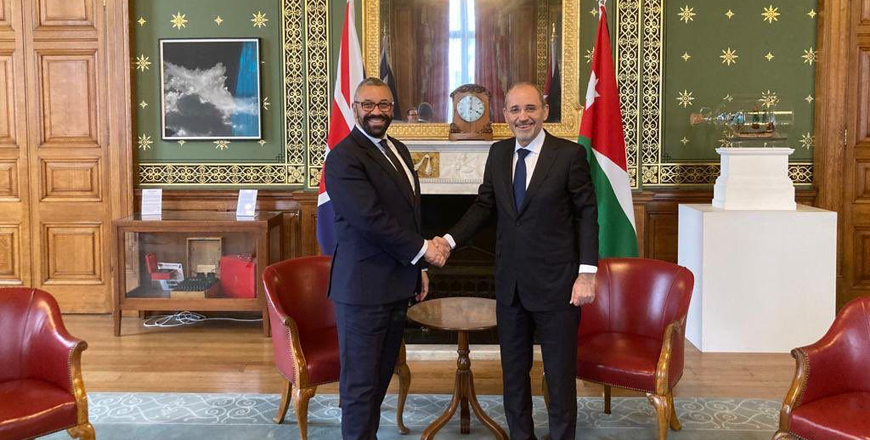AMMAN — Deputy Prime Minister and Foreign Minister Ayman Safadi on Wednesday met with UK Foreign Secretary James Cleverly in London.
The meeting came as an affirmation of the joint commitment to the distinguished historical strategic partnership between the two kingdoms and their peoples, said a Foreign Ministry statement.
The two ministers held extensive talks, focusing on a number of regional and international issues, foremost of which is the Palestinian issue.
The two ministers highlighted the “deep-rootedness” of the historical friendship that binds the two kingdoms, affirming continuation of efforts to enhance cooperation in developmental, economic, trade, defence and security fields.
Reviewing the growing trade between Jordan and the UK, the ministers noted that bilateral trade reached JD210 million in 2022, driven by an increase in the volume of Jordanian exports to Britain, which rose by 162 per cent compared to 2021.
The two ministers underlined the importance of the partnership agreement between the two kingdoms, which entered into force in May of 2022, to increase the volume of trade.
Safadi extended thanks to Cleverly for the UK’s continuous support for Jordan’s economic development programmes and for standing by the Kingdom in tackling the repercussions of regional crises.
Safadi welcomed the UK Home Office’s announcement on March 9, 2023, which revealed that Jordanian citizens will be among the first to benefit from the UK’s new Electronic Travel Authorisation (ETA) scheme.
Confirming cooperation in joint diplomatic training programmes, the two ministers also affirmed the continuation of work to bolster defence and security cooperation as well as combat terrorism, through the Aqaba Process.
Safadi briefed Cleverly on Jordan’s economic reform programme launched with the aim of improving economic performance, attracting investment and activating partnership with the private sector.
Cleverly voiced appreciation towards Jordan's role as a key partner in the region, lauding its efforts in enhancing security, peace and stability.
He also commended the humanitarian role Jordan plays in hosting refugees, stressing his country's commitment to continue supporting refugees in Jordan and the region.
Safadi thanked Cleverly for the continuous support provided by the UK to the UN Relief and Works Agency for Palestine Refugees (UNRWA) and Syrian refugees in Jordan.
The Palestinian issue topped the talks held by Safadi and Cleverly, where Safadi warned of the danger of continued escalation in the Palestinian territories.
The Jordanian minister called on the international community to take clear and effective steps to stop unilateral Israeli measures that fuel violence and undermine the two-state solution as well as confront hate speech and incitement that pushes for escalation, which was manifested in the speech of the Israeli minister of finance, who denied the existence of Palestinians, by holding an alleged map of Israel that includes Jordan and the occupied Palestinian territories.
Safadi also warned of the danger of the racist, exclusionary and extremist ideology of a current minister in the Israeli government.
Safadi underlined the importance of the UK's role in stopping the escalation and finding a real “political horizon” to re-launch negotiations to achieve a just and comprehensive peace based on the two-state solution, in accordance with the approved international references.
Briefing his British counterpart on the Aqaba and Sharm El Sheikh meetings and their political outcomes, he highlighted the necessity of implementing agreements and stopping illegal Israeli measures.
The historical and legal status quo in the Islamic and Christian holy sites in Jerusalem must be respected, Safadi said, stressing the importance of the Hashemite Custodianship over Islamic and Christian holy sites.
Safadi extended appreciation to the UK’s support to the two-state solution, rejection of settlements and violations of international law.
The two ministers discussed efforts to resolve the Syrian crisis, where Safadi briefed his British counterpart on the Jordanian initiative aimed at resolving the crisis and addressing its humanitarian, security and political consequences through direct Arab engagement with the Syrian government.
They affirmed their support for the security and stability of Iraq and its efforts to meet the aspirations of the Iraqi people.
Discussing the Ukrainian crisis and its regional and international repercussions, Safadi reiterated Jordan's calling for safeguarding Ukraine's unity and territorial integrity, stopping the war and resolving the crisis in accordance with international law and the UN Charter.
The two ministers agreed to continue communication and coordination within the framework of the strategic partnership between the two countries, contributing to achieving regional security and stability.
During his visit to the UK, Safadi also met with a number of senior officials, discussing Jordanian-British relations as well as a number of regional and international issues of common concern.
The meetings featured Minister of State for the Middle East, North Africa, South Asia and United Nations Lord Ahmad of Wimbledon, UK Parliament’s Chairperson of the International Development Committee Sarah Champion, Chairperson of the Foreign Affairs Select Committee Alicia Kearns and member of the committee Lord Mark McInnes, Vice Chair of the Jordan Group in the UK Parliament Alistair Carmichael as well as a number of members of the group, UK Deputy National Security Adviser Sarah Maclntosh, Chairman of the Defence Committee in the UK House of Commons Tobias Ellwood and committee member Kevin Jones.
Safadi also spoke at a session organised by the British Royal United Services Institute (RUSI) that focused on the Jordanian-British relations, the Palestinian issue and the Syrian crisis.
